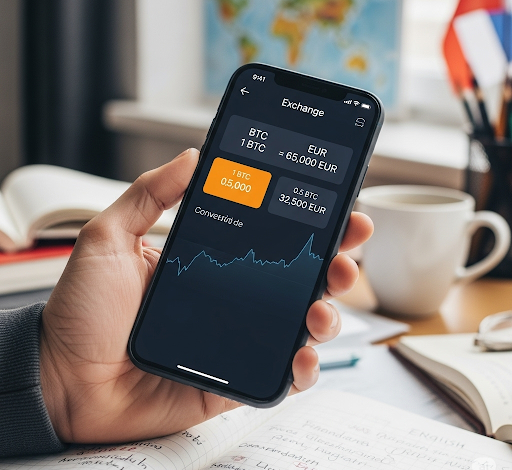Bitcoin to Euro: A Guide for International Students

Making ends meet while studying abroad can be difficult. One way that many international students in Europe are starting to be able to do this is through cryptocurrencies and Bitcoin, specifically for lifestyle expenses, as well as getting into digital assets as a whole. Knowing how to exchange bitcoin to euros will help students reduce fees as well as help them with currency exchange and money management while they study abroad. The more students can learn about bitcoin to euros goes a long way in overcoming the myriad challenges in studying abroad and adapting to their new countries.
Reasons International Students Are Using Bitcoin Abroad
When an international student moves overseas, it’s often their first encounter with the complexities of traditional banking. Opening bank accounts is often complicated and can require several local documents based on local regulations. Sending money internationally can also be complicated and costly, depending on the currency exchange and local fees.
Bitcoin is advantageous in a number of ways, as it has lower costs to transfer, quicker timeframes for transactions, there are only a few steps to set it up, and there are various app platforms that you can access from your mobile phone. Given Bitcoin’s ability to facilitate transactions quicker and easier than traditional banking—all while cutting down on high transaction fees—this alternative currency is valuable to use in international transactions. Bitcoin’s decentralization allows students to circumvent financial restrictions to make it easier and less risky for them to conduct financial transactions.
However, unless international students are using Bitcoin to pay for educational-related expenses, they will need to convert the btc a eur for something as basic as rent, grocery shopping, transportation, and tuition payments.
Best Ways for Students to Convert Bitcoin to Euros
1. Cryptocurrency Exchanges
Coinbase, Binance, Kraken, and Bitstamp are popular exchanges that will allow you to convert Bitcoin to euros. This allows students to sell their bitcoin and have their euros withdrawn to a bank account. These exchanges provide stable user interfaces, provide live exchange rates, and provide a safe hold for digital assets.
2. Peer-to-Peer (P2P) Platform
Paxful provides peer-to-peer buying and selling, allowing students to buy Bitcoin for Euros through different payment methods, like bank transfers and cash deposits. This gives you flexibility and low prices compared to the other options, but you also need to vet your business partner to prevent fraud and to create safety for both buyer and seller. P2P platforms are slower and more cumbersome than exchanges.
3. Bitcoin ATMs
There are Bitcoin ATMs that allow the user to sell Bitcoin and take out cash in Euros instantly. Crypto ATMs provide immediate access to cash for students, but there exists only a limited number of Bitcoin ATMs compared to other methods previously mentioned, and they generally charge a higher fee than exchanges.
How Students Can Effectively Manage the Bitcoin to Euro Exchange
Check Exchange Rates: The price of Bitcoin can fluctuate considerably. Use apps or websites with BTC/EUR rates to exchange at a favorable time.
Be Wary of High Trading Fees: It is important to determine which platform has the best fees. You should check numerous platforms to compare various fees, trade fees, withdrawal fees, and opposite price margins on payment options.
Fraud: Stick to platforms with a good reputation, avoid marketplace P2P sellers, and learn how to properly manage your wallet; do not share your wallet keys or sensitive personal information with others.
Work Ahead: If you need to make large payments for tuition or a residence deposit, you should work in advance (e.g., a month). So you do not have to worry about time delays.
Keep Track of Your Money: Hold on to your transaction receipts and track your transaction records, not only to keep your budget in check but also in the chance that you need to report to tax authorities.
Tax and Legal Considerations
European nations are increasingly regulating crypto assets. Most governments in Europe classify Bitcoin not as a currency but as an asset. So if a student sells Bitcoin for Euros, that transaction is subject to tax regulations relative to asset sales, requiring students to declare gains or losses. If a student is studying overseas and will be engaging in crypto activity, the student should:
Research the crypto laws in the country they are studying. Maintain a record of their crypto transactions. Speak with their financial advisor or other campus resources if they are uncertain.
Takeaways
For students abroad in Europe, the process of converting Bitcoin to Euros can provide and modern and efficient way to manage finances while avoiding banking inconveniences. Students studying abroad can eliminate many of the hassles in managing finances by understanding how the Bitcoin to Euro exchange process works, positioning themselves to use the right platforms, and taking precautions. The ability to use cryptocurrency as a means to pay for tuition and living expenses can go very smoothly once they are aware of and pay attention to exchange rates, interchange and transaction fees, and local regulatory considerations, allowing students to experience a safe, cost-effective, and simple process while taking advantage of their time studying abroad.



